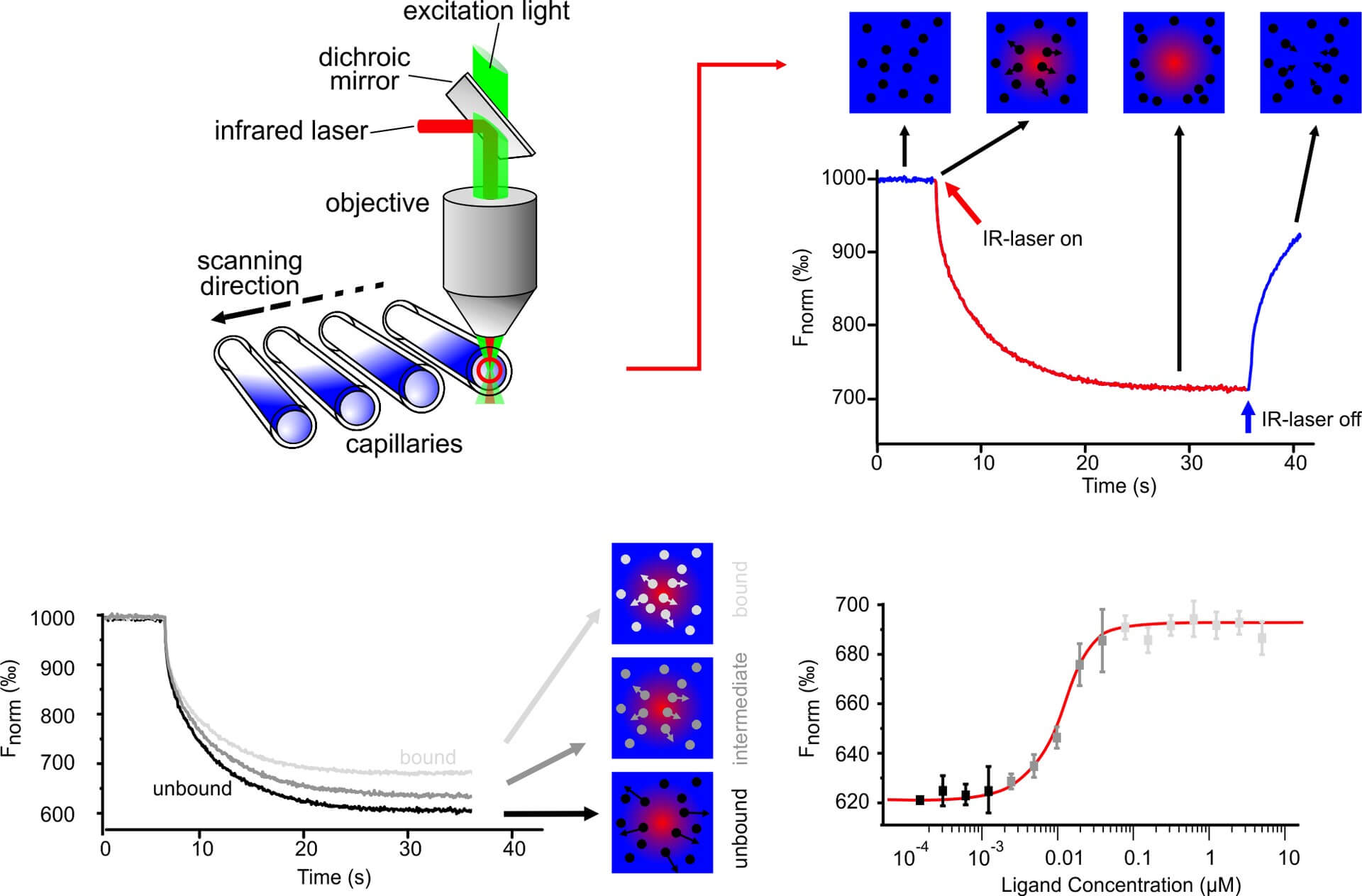Microscale Thermophoresis (MST)
Creative Biostructure can offer the powerful biophysical technology named microscale thermophoresis (MST) for the analysis of molecular interactions. We are highly experienced and knowledgeable in applications of MST from small-molecule binding events to protein-protein interactions.
Nowadays, there are various methods in measuring the affinity of interacting molecules and providing information on the binding mechanism and binding kinetics, including semi-quantitative assays like electrophoretic mobility shift assay (EMSA) and pull-down assays, surface plasmon resonance (SPR), isothermal titration calorimetry (ITC), fluorescence anisotropy (FA) and fluorescence correlation spectroscopy (FCS).
MST is a innovative and precise method to quantify the interaction analysis of biomolecules. It is well known that MST technology is based on thermophoresis, measuring the directed motion of molecules in a microscopic temperature gradient, which strongly depends on a variety of molecular properties such as size, charge, hydration shell or conformation. Therefore, this technique is highly sensitive virtually any change in molecular properties, moreover, is easy to handle in measuring interactions with essentially no limitation on molecule size or molecular weight. Additionally, MST holds another significant advantage: immobilization-free and label-free technology, which allows for measurement of interactions directly in solution without the need of immobilization on a surface.
The core part of MST system consists of an infrared (IR)-laser coupled into the path of fluorescence excitation/emission using an IR dichroic mirror. The IR-laser is focused into the sample through the same optics that is utilized for fluorescence detection. MST can be measured in capillaries with a total volume of about 4 μL. In a typical MST assay, the biomolecules are homogeneously distributed and a constant termed “initial fluorescence” can be detected. After activation of the IR-laser, the temperature jump (T-Jump) is observed, which corresponds to a fast change in fluorophore properties owing to the rapid temperature change. Subsequently, thermophoretic movement of the fluorescently labeled molecules out of the heated sample volume can be detected. After deactivation of the IR-laser, an inverse T-Jump occurs, followed by the “backdiffusion” of molecules, which is solely driven by mass diffusion.
 Figure 1. The
principle of MST technique. (Wikipedia)
Figure 1. The
principle of MST technique. (Wikipedia)
Key features of MST assay, including:
- Aintenance free platform
- Easy handling;
- Excellent selectivity using a fluorescent dye or fluorescent protein;
- Rapid assay optimization and measurement (Kd in 10 min);
- Low sample consumption;
- Immobilizaion free (in-solustion measurement) and label-free;
- Time and cost effective
- Broad applicatioin ranges
-access affinities (Kd, dissociation constant)
-exmine multi-materials (peptides, ribosomes, ions, nucleosomes, liposomes and more)
-study membrane proteins directly in liposomes or detergent solution,
-study the binding energetics ΔG (free energy), ΔH (enthalpy) and ΔS (entropy)
-etc.
Our MagHelix™ analytical methods for biophysical characterization of biomolecules include but are not limited to:
- Protein Thermal Shift Assay (PTSA)
- Surface Plasmon Resonance (SPR)
- Isothermal Titration Calorimetry (ITC)
- Differential Scanning Calorimetry (DSC)
- Saturation-Transfer Difference (STD)
- Bio-Layer Interferometry (BLI) Technology
- Thermal Gravimetric Analysis (TGA)
Creative Biostructure also provides other Bioanalysis and Biophysical Characterization services for your specific projects. Please feel free to contact us for a detailed quote.
Ordering Process
References:
M. Jerabek-Willemsen, et al. (2014). MicroScale Thermophoresis: Interaction analysis and beyond.
J. Mol. Structure, 1077: 101-113.
M. Jerabek-Willemsen, et al. (2011). Molecular Interaction Studies Using
Microscale Thermophoresis. Assay Drug Dev Technol., 9(4): 342-353.
Microscale thermophoresis.
(https://en.wikipedia.org/wiki/Microscale_thermophoresis)

